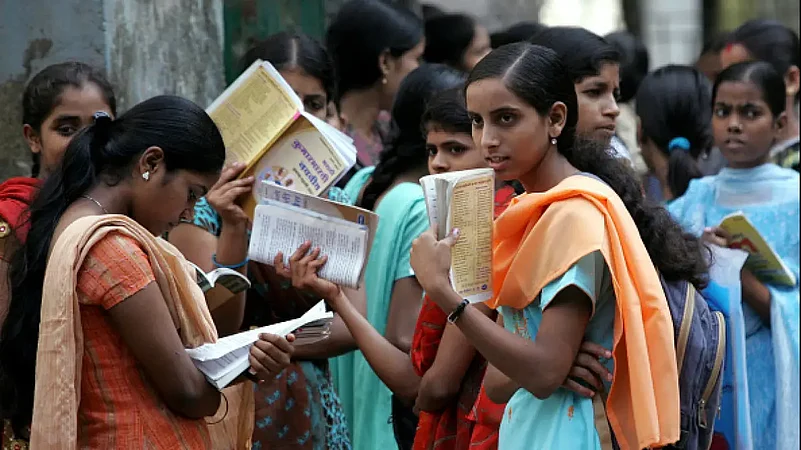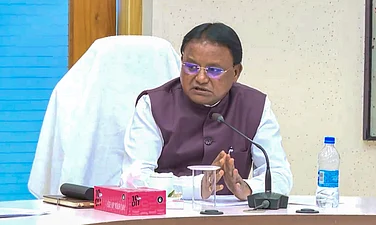Since its formation in 1961, following the independence of India, the National Council for Education Research and Training (NCERT) has played a key role in nation-building as well as in setting national narratives and ideas of state. An autonomous body formed by the union government, NCERT has undergone several changes in terms of the contents and philosophy of its syllabi. With the recent changes announced as part of the syllabus 'rationalization' exercise, the Council has once again been facing flak for deleting important portions of social sciences including India's medieval and contemporary socio-political history.
This, however, is not the first time that the NCERT books have been updated. Indeed, regular updation of books taught in schools and colleges to keep up with contemporary discoveries and changes in society. While some have been welcome, others have been criticised.
Here's a brief timeline of some of the major shifts in NCERT's syllabi.
1961: NCERT was formed by merging several existing bodies.
1960s: This was a phase of post-independence when textbooks were created to highlight Indian history from a ‘secular’, ‘unbiased’, and anti-colonial standpoint. Books by academics like Romila Thapar, Bipan Chandra, Satish Chandra, Ram Sharan Sharma and others were added.

1970s-90s: Instances of historical revisionism to promote Hindutva ideology noted several times through these decades under the Janata Party rule (1977-1979) and BJP (1998-2004) governments. The Janata Party government accused NCERT books like Thapar's Medieval India and Bipan Chandra's Modern India among others of being "anti-national"
2002: The NDA govt tried to change the curriculum in attempt to remove previous ‘Marxist’ influence.
2005: The NCERT was overhauled and National Curriculum Framework (2005) was introduced in an attempt by Congress to undo BJP government’s changes.
2012: NCERT slammed for allegedly insulting the government by publishing 'offensive' cartoons in its textbooks.
Post 2014: Three revisions/reviews in textbooks. The latest comes before the fifth proposed revision of the National Education Framework.
2017: NCERT updated 182 textbooks. Topics like Swachh Bharat, Digital India, ‘Beti Bachao Beti Padhao’, demonetisation and GST added to books
2018-19: Contents were added in history textbooks regarding knowledge, traditions and practices of India including portions on Vikram Samvat (the Hindu calendar), metallurgy, Shivaji Maharaj, Paika revolt, Subhash Chandra Bose, Swami Vivekananda, Ranjeet Singh, Rani Avantibai Lodhi and Sri Aurobindo Ghose was also added. A chapter on Maharana Pratap was also added to Class 7 syllabus.

2019: NCERT makes key deletions, particularly in history textbooks. A chapter on violent caste conflicts dropped from Class 9 textbooks. Along with chapters on the colonial history of cricket and a chapter titled ‘Peasants and Farmers’. Chapters on nationalism in Indo-China, on the rise of cities, and on ‘novels, society and history, were dropped from Class 10 NCERT books.
2022: Atal Bihari Vajpayee’s statements against communal violence in Gujarat dropped, chronology of Godhra violence cut out, quotes by Nehru, Ambedkar dropped, history of Naxalite movements cut short. The discussion box on-farm laws dropped. Discussion on history of caste oppression, justifications of caste in Vedas, dangers of communal politics cut short. Portions relating to Mughal rule cut short and details about courts and administrative systems were omitted. History of other Islamic rulers including Mamluks, Khaljis, Delhi Sultanate cut short by various pages.
2022: CBSE drops poems of Faiz Ahmed Faiz from chapter on 'Religion, Communalism and Politics – Communalism, Secular State' from NCERT Class 10 Pol Science books. Political cartoons about communal politics, a chapter on ‘Central Islamic Lands’ and impact of globalization on agriculture were dropped from other senior secondary textbooks.
While the government has claimed that the 'rationalisation' process is meant to reduce the workload of students, critics claim that the cuts have majorly been made in the social science books. While authorities have said the deletions have been made based on repetitions, critics claim that the move is politically motivated.
















